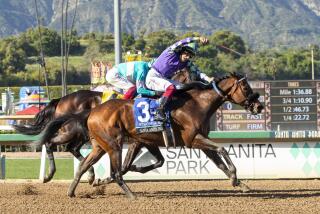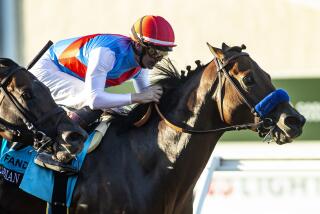HORSE RACING : The Sheiks Don’t Need Us Now
- Share via
Over the last decade, the Maktoum brothers have dominated Keeneland’s summer thoroughbred yearling sale, the most prestigious and expensive horse auction in the world. The three fabulously wealthy Arab sheiks have spent more than $400 million at Keeneland, and in some years have accounted for as much as 40% of the sale’s gross business. Their influence has shaped the U.S. breeding industry.
But when the Keeneland sale was held recently, the Maktoums were nowhere near Lexington, Ky. Their agents did buy a few horses, but the purchases were relatively modest ones, by the sheiks’ past standards of the past.
Their lack of interest had a predictable effect on the sale. At the end of Tuesday night’s session, the average price of a yearling was $235,433, down 9% from the previous year’s sale. The incredible year of 1984, when the Maktoums drove the average price of a Keeneland yearling to $544,581, is a dim memory.
Declining prices are a familiar story in the breeding business. What was significant about this sale was the Maktoums’ absence--and the reason for it. Michael Goodbody, the manager of one of the sheiks’ British breeding operations, told the Daily Racing Form: “We found a lot of yearlings we bought at Keeneland in the last years haven’t been very successful.”
Saying that you can’t seem to find a good horse in Kentucky might sound a bit like saying you can’t find a good meal in France. And yet even many Kentuckians had to agree with the gist of Goodbody’s assessment. The horses being sold at Keeneland this week aren’t nearly as good as in past years.
Bill Oppenheim, editor of the newsletter Racing Update, said he attributes the drop in prices not to any weakness in the market but “to a decline in the quality of the catalogue.” Many of America’s best sires--including Alydar, Fappiano and Blushing Groom--have died. Most of the established stars among the stallions are growing old: Mr. Prospector, Danzig, Seattle Slew. But a new generation of outstanding U.S. stallions has not come along to replace them.
There haven’t been too many exciting horses in U.S. classic races in recent years, and the same horses haven’t generated excitement at stud, either. Not since Pleasant Colony in 1981 has the winner of a Triple Crown race developed into an important stallion. This drought has almost certainly been caused by a profound shift in the balance of horsepower between the United States and Europe--the second one in this century.
The postwar growth of the U.S. thoroughbred industry was made possible by such farsighted breeders as Bull Hancock, who imported influential stallions from abroad. The genes of European horses such as Nasrullah, Blenheim II and Princequillo transformed the species and enabled America to produce the fastest, toughest racehorses ever.
The blood of Nasrullah was in Secretariat, Seattle Slew, Spectacular Bid, Ruffian. Around the world, the sport envied and admired this nation’s horses.
If foreign buyers had tried to take control of some other great American resource or industry--if, for example, they had started gobbling up all the small high-tech companies in Silicon Valley--Americans might have reacted with outrage or resistance. But when the big foreign money started to appear at American yearling sales in the late 1970s, breeders were delighted to take it.
Yet those who cashed in never profited in the long run. Spendthrift Farm, once the world’s leading commercial breeder, went bankrupt; mighty Calumet Farm went bankrupt.
It will not be easy for the American thoroughbred industry to recover, because its shelves have now largely been cleared--that’s the message signaled by the Maktoums’ absence from Keeneland. They have acquired so many outstanding racehorses, stallions and mares for their own European breeding operations that they don’t covet American horses any more.
More to Read
Go beyond the scoreboard
Get the latest on L.A.'s teams in the daily Sports Report newsletter.
You may occasionally receive promotional content from the Los Angeles Times.










